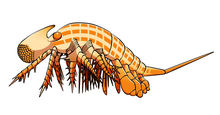Cambropachycope
| Cambropachycope Temporal range:
| |
|---|---|

| |
| Scientific classification | |
| Domain: | Eukaryota |
| Kingdom: | Animalia |
| Phylum: | Arthropoda |
| Family: | †Cambropachycopidae |
| Genus: | †Cambropachycope Walossek & Müller, 1990 |
| Type species | |
| Cambropachycope clarksoni Walossek & Müller, 1990
| |
Cambropachycope is a genus of small (1.5 mm (0.059 in) long) extinct Cambrian arthropods, known from the Orsten lagerstätten in southern Sweden. It appears to have several apomorphic features, notably including a single large compound eye.[1]
Morphology
[edit]
The head of Cambropachycope has an unusual anterior projection that bears a single, large compound eye. The eye structure is well preserved, and shows three layers in the cornea, an outermost and innermost layer of transparent material and a hollow middle layer containing a dark material. This middle layer was probably used for filtering out the blue, scattered light from sunlight.[2] There are four pairs of appendages on its head. The first pair of appendages are treated as antenna, and the other pair is biramous. The mouth opens on the ventral surface in front of the second pair of appendages.[1] Its abdomen has four segments with two pairs of paddle-shaped appendages and a telson.[1]
Ecology
[edit]According to its eye structure, Cambropachycope was probably a predator.[2]
Etymology
[edit]The genus name Cambropachycope refers to the large unilobed eye, alongside it originating from the Cambrian period. The specific name clarksoni honours E. N. K. Clarkson.[1]
Classification
[edit]
It is hesitantly presumed to be an early offshoot under the clade Pancrustacea in original description. It consists of the species Cambropachycope clarksoni. Other organisms, including Henningsmoenicaris and Martinssonia also discovered in Orsten, may exist at a similar place on the phylogenetic tree. Collectively, this may have implications for the origins of the crustaceans.[1] However, later study placed this genus outside Pancrustacea, and just treated as stem-group Mandibulata.[3]
See also
[edit]References
[edit]- ^ a b c d e Waloszek, Dieter; Müller, Klaus (1990-10-01). "Upper Cambrian stem-lineage crustaceans and their bearing upon the monophyly of Crustacea and the position of Agnostus". Lethaia. 23: 409–427. doi:10.1111/j.1502-3931.1990.tb01373.x.
- ^ a b Parker, Andrew R.; Schoenemann, Brigitte; Haug, Joachim T.; Waloszek, Dieter (2013-08-01). "An Unusual Cornea from a Well Preserved ('Orsten') Cambrian Compound Eye". Paleontological Research. 17 (3): 251–261. doi:10.2517/1342-8144-17.3.251. ISSN 1342-8144. S2CID 129851449.
- ^ Edgecombe, Gregory D. (2017-09-01). "Inferring Arthropod Phylogeny: Fossils and their Interaction with Other Data Sources". Integrative and Comparative Biology. 57 (3): 467–476. doi:10.1093/icb/icx061. ISSN 1540-7063. PMID 28957518.
